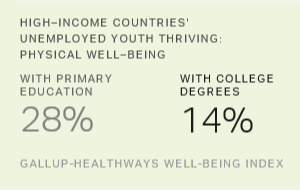This article is the second in a series based on results from ║┌┴¤═°'s polling conducted amid the recent protests in Turkey. The first examined urban Turks' falling trust in major institutions.
WASHINGTON, D.C. -- More than one in three Turks (35%) rate their lives poorly enough to be considered "suffering," according to ║┌┴¤═° surveys conducted amid the recent protests in the country this year, nearly double the 18% suffering found in 2012.

║┌┴¤═° classifies respondents as "thriving," "struggling," or "suffering," according to how they rate their current and future lives on a ladder scale with steps numbered from 0 to 10 based on the . Those who rate their present life a 7 or higher and their life in five years an 8 or higher are classified as thriving, while those who rate both dimensions a 4 or lower are considered suffering. Respondents whose ratings fall in between are considered struggling.
Big Rise in Suffering Among Urban Turks
Suffering among residents of large Turkish cities, those with at least 100,000 inhabitants, shot up to 40% in May-June 2013 from 17% in 2012. The increase in suffering among residents of smaller cities and rural areas was not statistically significant.

It is important to note that most of the surveys took place after Turkish Prime Minister Recep Tayyip Erdogan ordered the raids of protesters' camps in Istanbul's Gezi Park on May 30-31.
Suffering in Turkey on the Rise Among Government Critics and Supporters
Political factors such as growing frustration over Erdogan's policies as indicated by are less likely to be contributing to the rise in suffering than economic factors.
Suffering among government critics and supporters is up in May-June 2013. Among Turks who are confident in the national government, suffering increased to 30% from 12%, while suffering increased to 41% from 25% among government critics. This finding suggests that increasing frustration with the Erdogan administration's policies is unlikely to be a major contributing factor to higher suffering rates in Turkey.

More Turks Struggling to Make Ends Meet
The increase in suffering accompanies a surge in the percentage of Turks struggling financially. Turks living in large cities as well as small towns and rural areas are increasingly finding it difficult or very difficult to get by on their present household income.
Six in 10 Turks living in urban or rural areas report struggling financially, up from four in 10 in 2012. Turks who have problems making ends meet are five times more likely to be suffering than those who see themselves as living comfortably or getting by on their income.

Urban Turks Increasingly Regard Economic Conditions as Bleak
Data on economic perceptions may help explain why suffering among urban Turks increased significantly in contrast with rural Turks. Three-quarters of city dwellers (76%) now rate current economic conditions in Turkey as "only fair" or "poor," up from 57% in 2012. The increase in the number of rural Turks who are downbeat about economic conditions was not statistically significant.

Implications
The hefty increase in suffering among Turks is another warning sign for the Erdogan administration, in addition to the . That suffering not only shot up among government critics, but also among government supporters, suggests that its roots are not chiefly political.
║┌┴¤═°'s data show that Turks across the country -- including the rural areas that are the traditional heartland of Erdogan's AK Party -- increasingly report problems getting by on their household income. With inflation in July reaching 8.9%, the Erdogan administration may need to intensify its fight against price increases to help improve the financial well-being of its citizens. Restoring optimism in the Turkish economy, especially among city dwellers, is also likely to prove a daunting task with global investors continuing to withdraw funds from emerging markets like Turkey, as interest rates rise in anticipation of the Federal Reserve's move to decrease its stimulus efforts in the U.S.
For complete data sets or custom research from the more than 150 countries ║┌┴¤═° continually surveys, please contact us.
Survey Methods
Results are based on face-to-face interviews with approximately 1,000 adults, aged 15 and older, conducted in July 2008, November 2009, July 2010, May 2011, March 2012, June 2012, and May and June 2013. The two surveys from 2012 were combined into a single measurement. The 2013 survey was conducted May 19-June 23, 2013, with most interviews taking place in June. For results based on the total sample of national adults, one can say with 95% confidence that the margin of sampling error is ┬▒3.8 percentage points for the 2013 data. For results that are based on the two sub-samples of residents of cities with at least 100,000 inhabitants and residents of smaller cities and rural areas, the margin of error varies between ┬▒9.2 and ┬▒10.6 percentage points for the 'suffering' data from 2013 and between ┬▒6.5 and ┬▒7.4 percentage points for the data on feelings about household income. For results shown that are based on the two sub-samples of government supporters and critics, the margin of error varies between ┬▒6.1 and ┬▒7.4 percentage points for the 2013 data. The margin of error reflects the influence of data weighting. In addition to sampling error, question wording and practical difficulties in conducting surveys can introduce error or bias into the findings of public opinion polls.
For more complete methodology and specific survey dates, please review .
